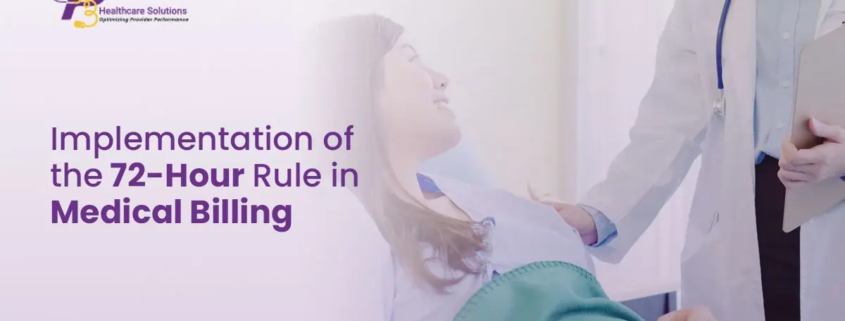Implementation of 72 Hour Rule in Medical Billing
“Medicaid Services” & “The Centers for Medicaid Services” has rigged the three-day rule against the combat fraud related to the “False Claims Act,” that rule is known as “the 72-Hour Rule”. As a result, all the outpatient diagnostic or other medical services delivered within 72 hours of hospital admission are billed collectively instead of individually. This can help prevent fraudsters from billing for services the patient did not receive.
What is meant by the 72-hour rule?
In the healthcare system, so many policies, including the 72-hour rule, have been implemented to help prevent fraud and abuse. Besides this rule, the CMS wants all the claims for payment to have been submitted within the specific time frame so that the physicians only charge for the medical services given to the patient and then providers keep accurate and complete medical records.
By following this rule, providers can be assured that billing has been done correctly and no fraudulent activities are involved in the payment procedure. If you have any questions regarding the 72-Rule, then you should be concerned with the local nearby CMS office.
Services involved in CMS 72-hour rule
In the “72-Hour Rule,” these Diagnosis services are included
- Radiology
- Lab-work
- CT scans
- Cardiology
- Anesthesia
- Nuclear medicine
- Osteopathic services
- EEG
- EKG
Medicare’s “72-Hour Rule” Inclusions & Exclusions
Inclusions in 72-hour Medicare Rule
Here are some examples of what is involved under this rule:
- Weight measurements
- Eye exams
- Blood-pressure check-ups
- Urine tests
- Electrocardiograms (ECGs)
- Pulmonary Function tests (PFTs)
- Chest x-rays
- Upper gastrointestinal series (UGI’s)
- Lower gastrointestinal series (LGIs)
- Endoscopies
All of these services should be billed together as bundled only if done within the 72-hours of hospital admission; otherwise, they should be considered false claims.
Exclusions in the 72-hour CMS rule
On the other hand, some services don’t lie under the inclusions of this new CMS 72-hour rule, such as
- EKGs (unless they’re not concerned about a heart condition or some other cardiovascular issue)
- EEG’S
- PET Scans
- CT scans
- MRI scans
- X-rays (other than CXRs)
- Blood work
- Pain medication prescription
All of these services should be billed individually if they are done within 72 hours; otherwise, they will be considered false claims.
What’s the reason behind the “CMS 72-hour rule”?
The main reason behind this decision is that the patients were admitted to the hospital many times but only got some outpatient services during their stay. So, if all of these services are billed separately, it will be difficult to tell whether or not they were rendered. But, on the other hand, if they are billed together, it will be easier to see if all the services were performed.
Where does the “72-hour Medicare Rule” apply?
The 72-hour rule applies to all Medicare providers, including hospitals, medical professionals, and other physicians. The CMS states that all the claims should be monitored and submitted according to this new rule, and serious action will be taken against the fraud if it’s revealed.
Keep the record
When the patient is admitted to the hospital, then it’s the responsibility of the staff to keep an accurate record. This is so important that Medicare can properly process and pay the medical bills. To meet the Medicare requirements, each bill must contain the following information:
- Patient’s age
- Gender of the patient
- Discharge disposition
- Performed procedure
CAATs assist hospitals in adhering to the 72-hour Medicare Plan Rule
Most hospitals are struggling to comply with the 72-Hour plan Medicare rule, which requires that all Medicaid patients be bundled together. As a result, some hospitals are converting to Computer-assisted audit techniques (CAATs) to avoid penalties and to help spot separate bills that should be bundled. CAAT helps to prevent mistakes and ensure compliance with the law.
Importance of “Compliance with the 72-Hour rule
Compliance with CMS 72-Hour Rule is so important because it helps prevent overbilling and fraud. This rule is just quite simple to accidentally double-bill Medicare. The CMS and the Office of Inspector General (OIG) closely monitor compliance to avoid overpaying the bills to physicians and hospitals. When the breach of the law by the providers, they risk being questioned and having their overpayments recovered, which could result in harsh financial consequences for the services they render.
Conclusion
According to the guidelines of Medicare, certain services should be accomplished within 72 hours for the providers to be reimbursed. These services include skilled nursing facility care, home healthcare, and inpatient hospital care. This rule is designed to prevent providers from billing Medicare services that were not even performed.
















“How does the implementation of the 72-hour rule impact medical billing practices?”
The implementation of the 72-hour rule has a significant impact on medical billing practices. This rule requires hospitals to bundle together services provided within a 72-hour timeframe for a single diagnosis. It affects billing by consolidating charges into one comprehensive bill, simplifying the process and reducing administrative burden. This rule ensures appropriate reimbursement for related services and promotes efficiency in medical billing practices.